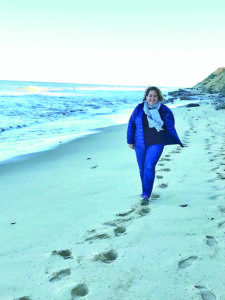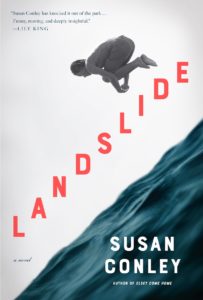Beginning next week, writer Karen Dukess is hosting a series of virtual talks with authors of new fiction and nonfiction via Truro Center for the Arts at Castle Hill. On Wednesday, Feb. 17, she’ll interview Susan Conley about Landslide, a novel about a woman raising two teenage sons in Maine while her husband, a commercial fisherman, is hospitalized miles away in Canada.

Dukess, the author of the 2019 novel The Last Book Party, which is set in Truro in the summer of 1987, is a worthy interview subject herself. Her path to fiction writing has been circuitous, taking her halfway around the world.
She grew up in Larchmont, N.Y. but spent summers in Truro. Her parents — her mother is artist Mona Dukess — had been coming to the Cape since the late ’50s and built a house on Toms Hill Road. “My mother always talks about going to Longnook when she was pregnant with me, with two other kids,” says Dukess.
As an undergraduate at Brown University, Dukess majored in Russian studies. “There wasn’t really a lot you could do with a Russian studies degree,” she says. So, after graduation, she led a tour to the Soviet Union, one thing you could do if you spoke the language. Travel agencies would hire young Americans who spoke Russian as guides for American tourists.
Back in New York, Dukess says, “I got a job at a literary agency that represented a lot of journalists who were traveling around the world and writing interesting books. And I was sitting in a little windowless office, typing on a Dictaphone, thinking I want to do that, not this.”
So, she studied journalism at Columbia University and left for Florida to work as a newspaper reporter. “Why Florida? Good question,” Dukess says. “At that time, Florida was growing really fast. Newspapers were growing, if you can believe it, and a lot were hiring.”
The tiny city of Inverness, in Citrus County, had three daily newspapers. “It was actually as foreign to me as Moscow, in some ways more, because I grew up in the New York area,” says Dukess. “Moscow’s a pretty sophisticated city. Rural north central Florida is quite different.”
When the Soviet Union collapsed, Dukess was working for the St. Petersburg Times. “I thought, what am I doing in Florida?” she says. She moved overseas and started working for Moscow Magazine and the Moscow Times, English-language publications that catered to expats. Dukess did a bit of everything: “I even reviewed restaurants for a while in Moscow — that was fun.”
She stayed there from ’92 to ’98 with her husband, journalist Steve Liesman, who got a job with the Wall Street Journal’s Moscow bureau.
When Dukess returned to the U.S., she worked as a writer for UNICEF, then as a speechwriter on gender equality for the U.N. Development Program. But she wrote fiction on the side. “That’s what I really wanted to do,” she says.

The Last Book Party draws on her experiences in Truro, but her second novel, which she is currently writing, is inspired by her time in Russia. For research, she returned there after 20 years of being away, and took her younger son, Johnny (who has worked as a reporter for the Independent). “It’s an interesting country,” Dukess says. “Each time you turn around, it changes dramatically.”
Dukess says her background in journalism has both helped and hindered her fiction writing. Though it taught her how to write on deadline and check facts, it also gave her the false impression that fiction writers had a clear story in their heads before putting pen to paper. “It took me a really long time to realize most writers I know do not write that way,” says Dukess. “You can write in order to discover what it is you want to write about.”
What most interests Dukess about interviewing authors is “their journey, the how-to of it,” she says. “I think in some ways being an author prepared me for doing these interviews more than being a journalist, because being a journalist, you’re not usually interviewing people in public.”
On upcoming Wednesdays, Dukess will interview author Robert Jones Jr. on The Prophets on March 17, Sarah Anne Johnson on The Last Sailor on April 21, Patrick Radden Keefe on Empire of Pain: The Secret History of the Sackler Dynasty on May 19, and Steven Rowley on The Guncle on June 16.
For the series, she tried to pick books that are related in some way to the Outer Cape. Conley’s Landslide is about the fishing industry. The Last Sailor’s Johnson is a Provincetown author. Both The Prophets, which is “about two enslaved men who are lovers on a plantation,” and The Guncle, which is “about a gay uncle in Palm Springs who ends up having to take care of a six and nine year old for three months,” deal with queer issues. Empire of Pain is about the opioid crisis, which “has affected Cape Cod really badly,” says Dukess. “Keefe does incredible reporting, but he writes these books like page-turners, like a thriller or fiction.”
When people think of Castle Hill they usually think of ceramics and visual art, but, in fact, it has always championed writing and literature. “It’s really fun to continue this tradition at Castle Hill and try to make it a little more visible,” she says.
On the Books
The event: Castle Hill Author Talks, hosted by Karen Dukess
The time: Wednesday, Feb. 17, 6 to 7 p.m. (Dukess interviews Susan Conley, author of Landslide)
The place: On Zoom via castlehill.org
The cost: Free; donations accepted



